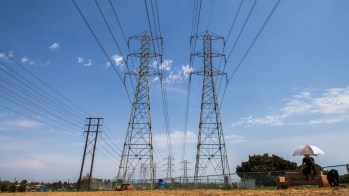Brits pulled into Enron net
TEXT OF INTERVIEW
SCOTT JAGOW: Three British bankers are booked on flight to the United States tomorrow. They don’t want to be on it. They’re being extradited to the US for Enron-related crimes. People in the British business community are very upset about this. Our European Correspondent Stephen Beard joins us from London. Stephen, what’s the uproar about?
STEPHEN BEARD: Well they’re upset because of the terms of the treaty under which these three gentlemen are being extradited. This was a treaty that was signed between the US and the UK in 2003. It was designed post-9/11 to fast-track extradition between the two countries and obviously it was aimed principally at terrorist suspects. The difficulty is that while the UK ratified this treaty, the US Senate is still refusing to ratify, so critics of the treaty and of this case say it’s a very lopsided arrangement.
SCOTT JAGOW: But how did these three bankers involved in some kind of Enron-related crime, how did they get embroiled in this treaty?
STEPHEN BEARD: Well these three guys worked for a British bank called NatWest. It’s alleged that Enron employees did a fraudulent deal with them. The three guys allegedly ripped off their bank and sold some assets to Enron. However, the British bank looked at this and decided not to prosecute. So here again is the source of a lot of the anger in the British business community.We have three British citizens being sent for trail in a US court for a crime allegedly committed in Britain, while the alleged victim of the alleged crime, a British company, didn’t think it was serious.
SCOTT JAGOW: Well if they were tried in the UK versus being tried in the US, what’s the difference?
STEPHEN BEARD: The difference would be in the sentencing were they found guilty. Here in the UK it’s reckoned they might face something like a prison sentence of 18 months, whereas in the US it would be very much stiffer, perhaps as long as 15 years. There’s a lot of anxiety about this case in the British community. Britain has forged many business links with the US. There are a lot of British companies that have American subsidiaries, and there’s a lot of concern that if an American subsidiary of a British company contravenes something like the Sarbanes-Oxley Act, we could see British directors being clapped in irons and shipped across the Atlantic to face a very lengthy prison sentence in the US.
SCOTT JAGOW: Well is there anything being done about the US not having ratified this treaty?
STEPHEN BEARD: Yes a British government minister will be going across the Atlantic tomorrow, not on the same plane as the three NatWest bankers, and she will try to attempt to persuade Senators to ratify this treaty.
SCOTT JAGOW: Alright Stephen, thanks a lot.
STEPHEN BEARD: OK Scott.
SCOTT JAGOW: Marketplace’s European Correspondent Stephen Beard in London.
There’s a lot happening in the world. Through it all, Marketplace is here for you.
You rely on Marketplace to break down the world’s events and tell you how it affects you in a fact-based, approachable way. We rely on your financial support to keep making that possible.
Your donation today powers the independent journalism that you rely on. For just $5/month, you can help sustain Marketplace so we can keep reporting on the things that matter to you.


















